
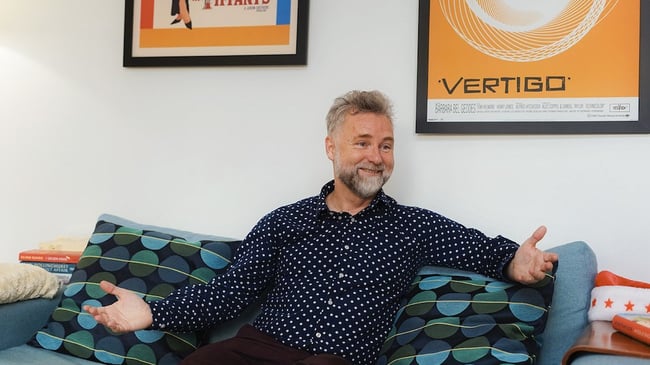
A day in the life of Darren Tulett
Photos Louis Canadas
Words Matthieu Morge-Zucconi
Share the article on
The BeIN sports presenter tells us how he became a journalist without any of the required diplomas, and talks purple suede suits, and makeup.
Cliquez ici pour le lire en français.
Darren Tulett caps off his story about his latest invitation to the British embassy by wondering jokingly why he hasn’t been approached to become a double agent yet. After all, as he puts it himself, he is “a literal poster boy for integration”. We promised that we would pass on his application if we ever had the chance, although his spotted shirt and socks, paired with his plum trousers didn’t exactly look like the standard uniform for international spies. The sports journalist, who had a segment on L’Équipe du Dimanche on Canal+ before moving to BeIN Sports, welcomed us in his home to talk about moving to Paris, how he became a journalist without having any of the required diplomas, and his underlying fear of being a fad.
Hello Darren. Could you introduce yourself to our readers?
My name is Darren Tulett. I’m 53 years old. People used to act surprised and tell me that I didn’t look my age at all, but I’m sorry to say that this doesn’t seem to be the case as often anymore. Last month was the anniversary of when I first moved to France, it’s been 30 years!
How did you end up moving to France in the first place?
I came with my friend Nick. We’d met in Manchester, where we were studying. I gave uni up after a year, but he kept on. I stayed in Manchester to live with my student friends, though. I expected university courses to provide me with incredible levels of intellectual stimulation, but it turned out to be nothing more than a gathering of wankers! I passed my A-levels and that’s it. When my friends graduated, we threw a proper English party, the details of which I have trouble remembering. The next day he called me to ask if I was still ready to go. Turns out I’d made plans to go to Paris with him during the infamous party. Well, why not, after all? I came to Paris with absolutely no idea of what I was going to do. I’m from a small town close to Brighton, a ghost town I’d always dreamt of leaving. I never imagined I’d actually stay in Paris. At that time, it was pretty obvious to me that this Parisian experiment would end with me returning home after a few months. We never came back. We worked in Paris, as English teachers to start, met some French girls and got married. Nick is also still in France, he lives in Angers now.
When you first came to Paris did you already know that you wanted to be a journalist?
When I was a kid, 10 or 11 years old, I wanted to be a journalist. The year I spent at the university I studied political science. In my youth, I was what you’d call a political animal, I was very invested. I spent my weekends either on the terraces supporting Brighton or marching in the streets to protest something: against Thatcher, for the release of Nelson Mandela, etc. I wanted to write about political life. When I was 28, I’d been an English teacher for 6 years, I was happy, but I was going around in circles and living one day at a time. I met a woman who became my wife and was supremely important in how I shaped the rest of my life. She said “all of this is good, but you’re not going to be a teacher for the rest of your life, you can be something else”. She pushed me towards achieving my dream of being a journalist. Had I not met her I might still be an English teacher today, and possibly a functioning alcoholic. We returned to Brighton, in the UK. She found a job within 30 seconds of our arrival, while I was still unemployed after 6 months.
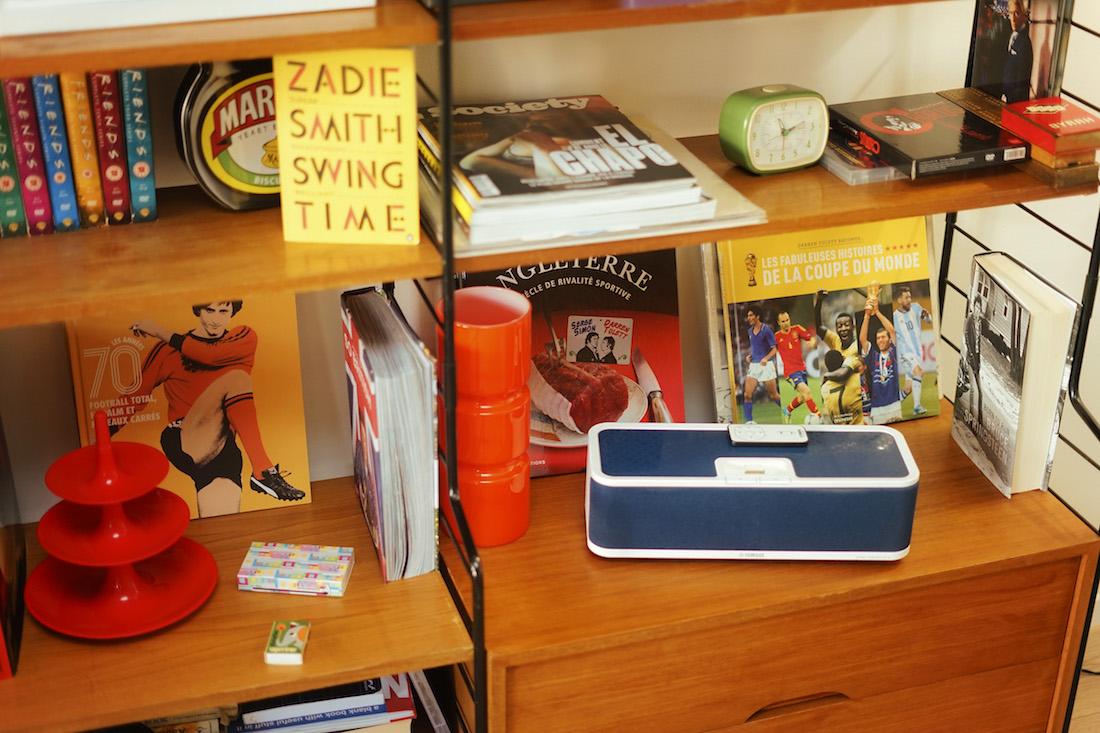
So how did you start your career in journalism?
As surprising as this might sound, I never got a call from the Times, Guardian, or BBC… Their loss, I suppose! At that time, I’d gotten into the habit of reading the Guardian every Monday, which was the day open journalism positions were listed. I was at the Café Rouge in Brighton - a pseudo French bar - and I stumbled upon a “Wanted: sports journalist” ad. Three conditions were listed: very good knowledge of all major British sports, good command of a foreign language, and at least two years’ experience. As Meat Loaf famously put it: “two out of three ain’t bad”. You have to remember that Google didn’t exist back then, and neither did thorough background checks. I introduced myself as a journalist for le Journal anglais de Paris, which was a real albeit very small newspaper. I told them I covered all sporting events for the paper for 3 years. None of this was true, obviously, but I still got called back for an interview. The guy told me they’d received 100 applications, which they planned to bring down to 6 finalists after 3 days of interviews and tests. It went extremely well. They first tested my French, and then asked me questions on golf, football, cricket, horse-racing, etc. At some point, the guy who was interviewing me asked me about rugby, and I saw his eyes light up. He asked me to give him the result of a match, which I did, adding that I was at Twickenham to watch the game in question. To which he answered that he was too. That was my open door. I let him talk about himself, and how much he loved playing rugby. It took so long that he ran out of time to ask me about my professional background! Journalism - at least in the written press - requires a great deal of creativity, and I creatively talked my way into my first job! That’s how I started at Bloomberg, which was only a fledgling company with three employees at the time. Two years later I got transferred back to Paris as a legitimate sport journalist.
How did you transition from the written press to TV work?
First, I became a radio journalist. I was scouted and offered a segment on Pierre-Louis Basse’s shows on Europe 1. Back then, Hervé Mathoux had recently started working at Canal +. He was asked to replace Thierry Gilardi on L’Équipe du Dimanche. He wanted to change the show’s format, and not simply pick up where Thierry Gilardi had left off. His idea was to make a football version of this existing show by Christine Bravo, who had a bunch of journalists reporting on European events. So Hervé needed and Englishman for British football, a Spaniard for Spanish football, and so on. Pierre-Louis was friends with Hervé and he gave him my number. I’ve had a great deal of luck throughout my career, and this was clearly a matter of being in the right place at the right time. Hervé called me on a Monday, we had lunch together on the following day, and that Sunday I was on air. No rehearsal, no pilot. It was a little hard to believe to be honest. I’d never done any TV work, and most of the team had the same level of experience as I did. We were all pretty crap, but I wasn’t the worst.
You quickly became known as “Darren d’Angleterre” (Darren of England), in part due to the character you’d created, and the way you dressed. Was this done on purpose, or did you just happen to dress that way?
Hervé had a very clear idea of what he was looking for. He wanted someone, when talking about Bernard Mendy who played for Bolton, who could say that Bolton is close to Manchester, and is of no interest to anyone other than people looking for a good fight. He couldn’t possibly say that, whereas I was free to be insulting towards my country! I gave Hervé the idea for Darren d’Angleterre, although I’m sure he would have ended up finding it himself. When you work on TV, you’re judged by the way you look. If you’re constantly dirty, ugly, and dressed like a hobo, you won’t last long. I suppose you could have poor hygiene and smell bad, we’re still a while away from odorama TVs. I was 35, not a kid anymore, and well aware of how things work. For my first ever appearance I wore a striped suit, a pink Paul Smith shirt, and a burgundy dotted tie. Beatles 1968 style, with a mod haircut, sort of. Hervé told me “good call, coming in disguised as an Englishman”. Except it wasn’t a disguise, that was just how I dressed! I played into it though, taking the Englishman stereotype as far as it could go. I had some items of clothing I kept specifically for the show, such as a purple suede suit I was particularly fond of. I mean, not everybody could pull of a suit like that, and most people wouldn’t want to anyway! Viewers liked my style and started wondering what I was going to show up in on the following week...
"When you work on TV, if you’re constantly dirty, ugly, and dressed like a hobo, you won’t last long"
At this point, you still worked for Bloomberg, right?
Yes, although I hadn’t really asked for anyone’s blessing to have two jobs at the same time. Probably because I knew that if I had, they wouldn’t have agreed to it. The people in my team at Bloomberg never watched anything sport-related on French TV so I felt safe. That was until the guys from So Foot had the bright idea of running a profile on me for their fourth or fifth issue, and my name ended up on the magazine’s cover. Franck Annese, who owns the magazine, is a friend of mine, and is incredibly business-savvy, in particular when it came to advertising. My name ended up plastered on newsstands throughout Paris! Someone at the office ended up coming to see me and asked me if I was working on TV, because my name was on a magazine. At that point I’d been doing it for 18 months, and I was left with no choice but having to pick one job over the other.
And you chose TV.
I took matters into my own hands: I got a meeting with Michel Denisot who was the channel’s Head of Sport Programmes at the time. I explained that I was going to have to leave the show, with the secret hope that he would ask me to stay, which he did. Unfortunately, a few weeks after I signed with Canal+, they lost the rights to the Premier League, which was the worst possible welcome gift. I was moved out of my role as the token English person to cover French football. It’s an industry where jealousy is rampant, and everyone is trying very hard to keep their job and/or take someone else’s. I still managed to stay 10 years at Canal+, I got to present my own shows, I really grew as a TV show presenter and host.
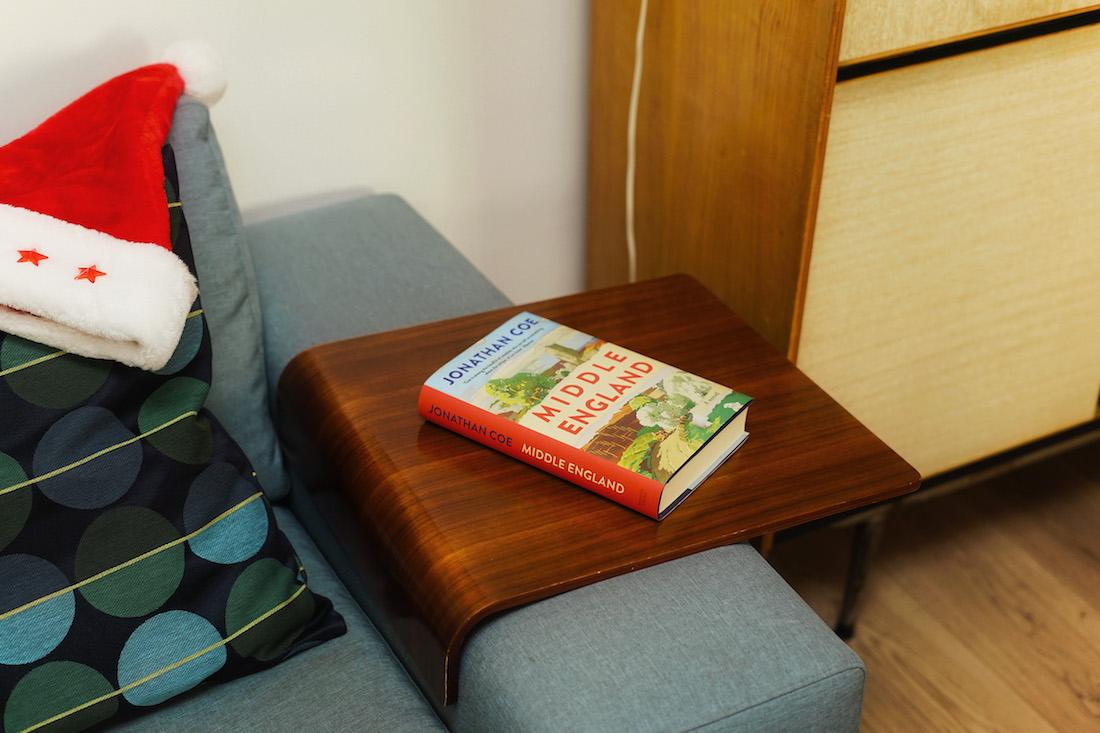
Then you moved to BeIN, which at this point was a brand new TV channel.
There were no prospects for me at Canal+. Getting stuck in a rut and just doing the least is the worst possible scenario when it comes to work. You have to learn to change to challenge yourself. It was pretty cool to be asked to join this new adventure. It’s super exciting to be a part of something from its inception. When they reached out to me, nobody really knew what it was going to be like, the channel was still called Al-Jazeera Sport. We built an office, a team, a full programme of shows, etc. On our very first broadcasting day, the entire industry was watching us in the hope of seeing us crash and burn! I spoke the very first words on this new channel. It’s something I’ll never forget.
Do you work from your office a lot?
For example, this afternoon I have to go to the office to prepare the next FA cup night. I’m very attached to journalistic standards, and being thoroughly prepared is what enables me to be so relaxed on air. I’m free to organise my time as I wish, but I enjoy being at the office because I like my colleagues. We have a lot of fun, laugh a lot, and generally take the piss out of one another. These days, with laptops and mobile phones you can do a lot of work without being in the same place as your co-workers. I like gossip, and there’s a lot of that going on at work! To be honest, I like 90 to 95% of the people at the office. I get along with nearly everyone. There are some arseholes, but they’re few and far between.
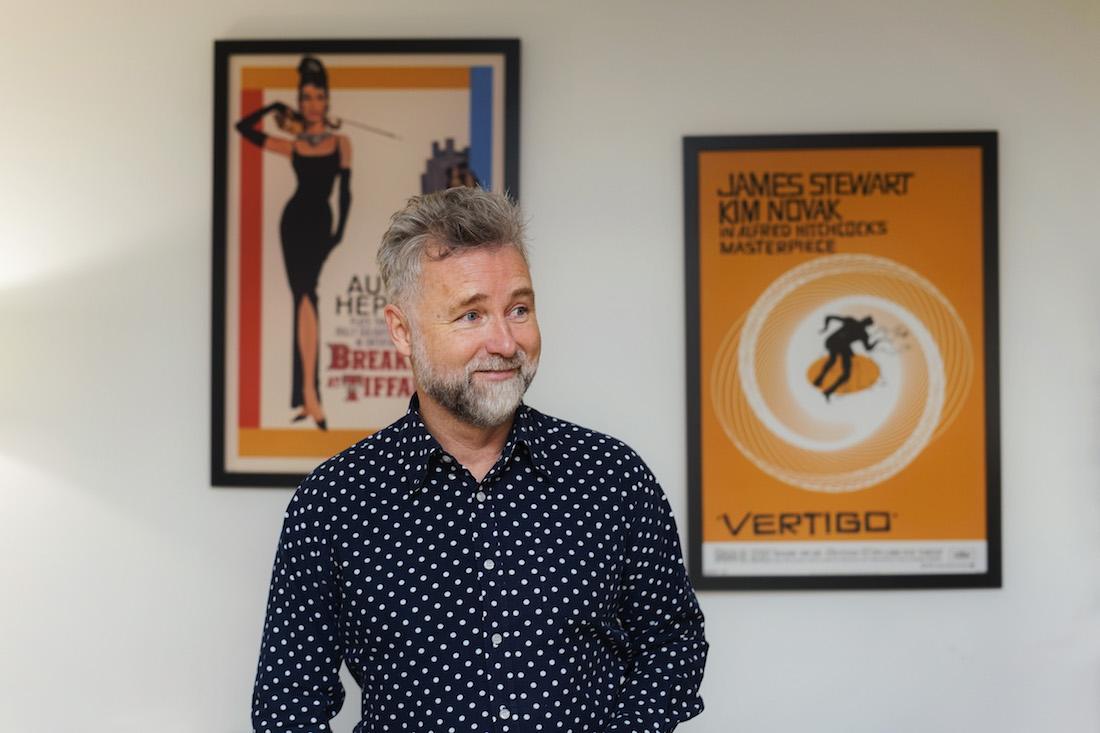
At what time does your day start?
At 6am, I get up, run an easy 10K followed by some yoga. Well, not really, that’s wishful thinking, as I’ve been carrying around an extra 5 kilos for the past 2 years. No two days are similar, really. Until recently my daughters helped me stick to a morning schedule because I had to drive them to school or prepare their breakfast. They’re old enough to manage on their own now, which means I don’t have to get up anymore. I really admire people who have the discipline to follow schedules they’ve set for themselves and work out in the morning, etc. I tend to stay up late. I read a lot, in bed, as I once saw that reading helped to fall asleep. However; I’m also the kind of person who always has to read the following chapter. I really enjoy thrillers, in particular Charles Cumming’s books. He’s like a modern John Le Carré!
With the amount of time you spend on TV, I imagine you have to wear makeup.
Always. You can’t go on air, without going through makeup first. I’m fortunate enough to have a good complexion, and my skin isn’t sensitive at all. On TV you quickly come to terms with the fact that your face is your fortune. You have to take care of yourself, respect your skin, moisturise it. It’s important to always look as good as you can.
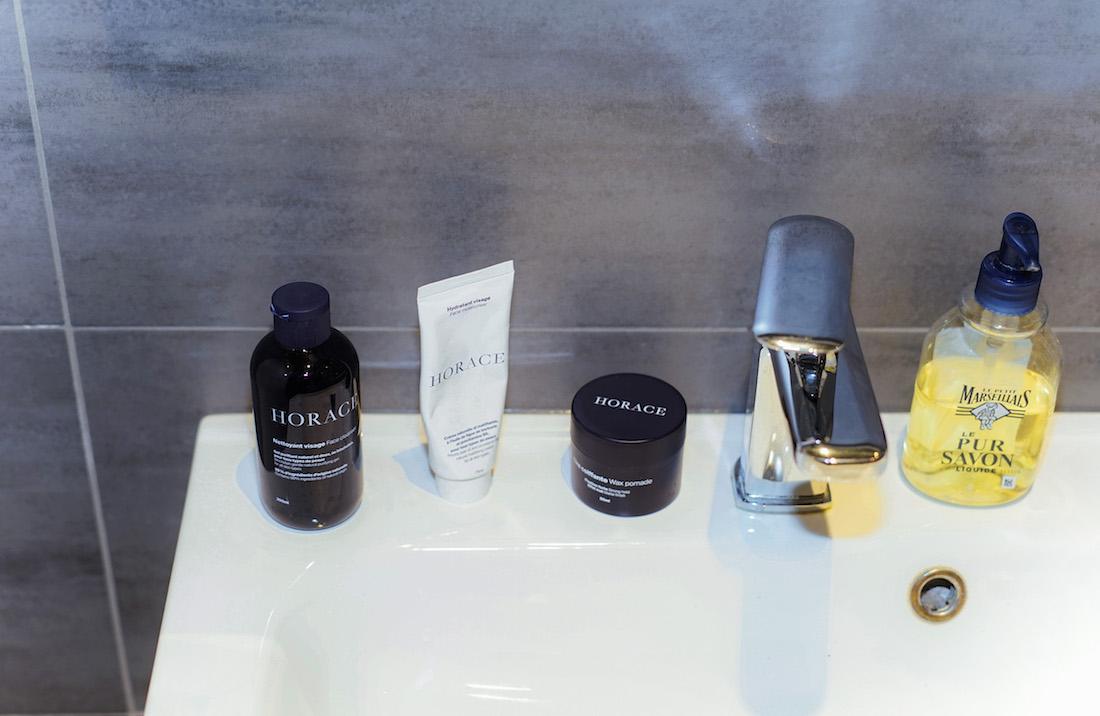
What products do you use to take care of your ‘fortune’?
After many years of using Nivea creams and antiperspirant deodorants, I wanted to switch to healthier products. I use the Horace face moisturiser, which I like a lot. I also like the deodorant which I use on a daily basis. I’m well aware that the products I used before weren’t very healthy. It took a few days for my body to get used to the Horace deodorant but it’s all good now. It also smells very nice, which is very important! I use the face cleanser when I shower, and I must admit that I sometimes use the Virginia cedar shower gel on my hair. But I’m 53 and still have hair, so I think I’ve earned the right to do whatever I want! I also use your wax pomade, which I like a lot, in particular its scent.
When did you start wearing a beard?
Approximately four years ago, I guess. Back when everyone started. It was like we all suddenly woke up with a full beard. Ten years ago, you’d have been hard pressed to find a single beard on TV. Then someone started, and we all followed suit. I can’t even remember who I copied. It’s rather practical, even if it requires some care to look good. I can’t really imagine not having one anymore.
"It was like we all suddenly woke up with a full beard"
Do you trim it often?
Yes, I do, but one of the upsides of working on TV is having hairdressers on call to ensure we all look sort of decent. I generally ask them to do my beard to. My neck always looks great, and my beard is always perfectly shaped as I can get looked after once a week if I want to.
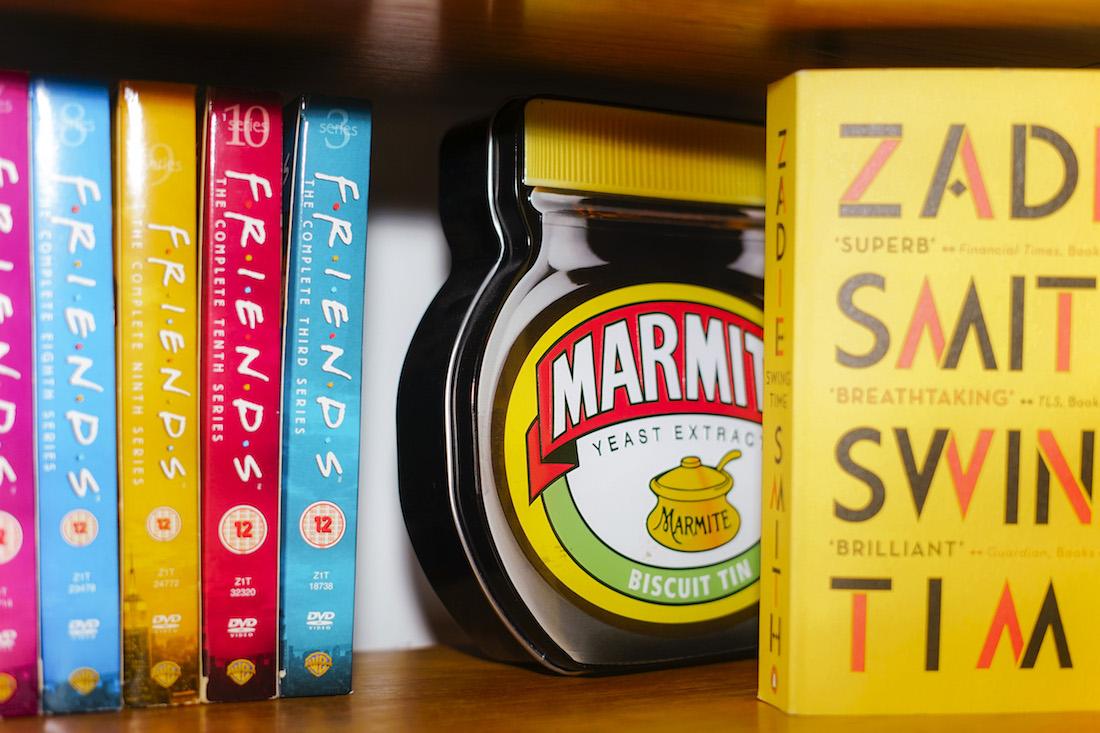
Other than your beard, it feels like you’ve slightly toned down your hair and clothing style. Is this simply because you’re getting older?
At some point, when I still worked for Canal+, I realised I’d become locked in this character I’d created. I didn’t want to be stuck in the role of a joker, I wanted to be able to do something else. It’s a question of growth I suppose. I wanted to present my own shows, not only have segments and be called upon for laughs. So I changed. Anyway, when you’re slowly edging towards 50 you can’t keep on wearing skinny trousers! I mean, not everyone’s Iggy Pop. There were some items of clothing I couldn’t wear anymore. I didn’t want to embarrass my children. That being said, I still have a load of dotted ties - which I love - as well as a few funky suits. I hope I haven’t become so dull that people might mistake me for a Frenchman! (laughs) I’ve noticed a really bad trend these past few years: some of my colleagues have taken to wearing a three-piece suit with an open shirt, which is the ultimate fashion faux-pas. It’s awful. If you’re cold, wear a wool cardigan under your jacket. A three-piece suit goes with a fully-buttoned shirt and a tie. That’s the law.
Where does this knowledge and attachment to the rules of style come from?
think it’s linked to my family’s poverty when I was a child. For a few years my clothes were hand-me-downs from friends and relatives. They were completely out of style, and I was stuck wearing flares when everyone else had switched to skinny jeans. When you’re a teenager, your style is everything, and my clothing was nothing like the way I saw myself. I did odd jobs left and right, I washed taxis, handed out flyers, I had a paper round… I didn’t have much, but I managed to buy a Fred Perry polo, a pair of Sta-Prest trousers, a Harrington jacket, and a pair of Doc Martens. This was back when ska was all the rage: Madness, the Specials, UB40, etc.
Those were your style references, back then?
Yes! I loved ska. And later on, Paul Weller from the Jam, who became a sort of spiritual guide after that. I think he tried a bit of everything, some of which he must have regretted, but he was a cool guy!
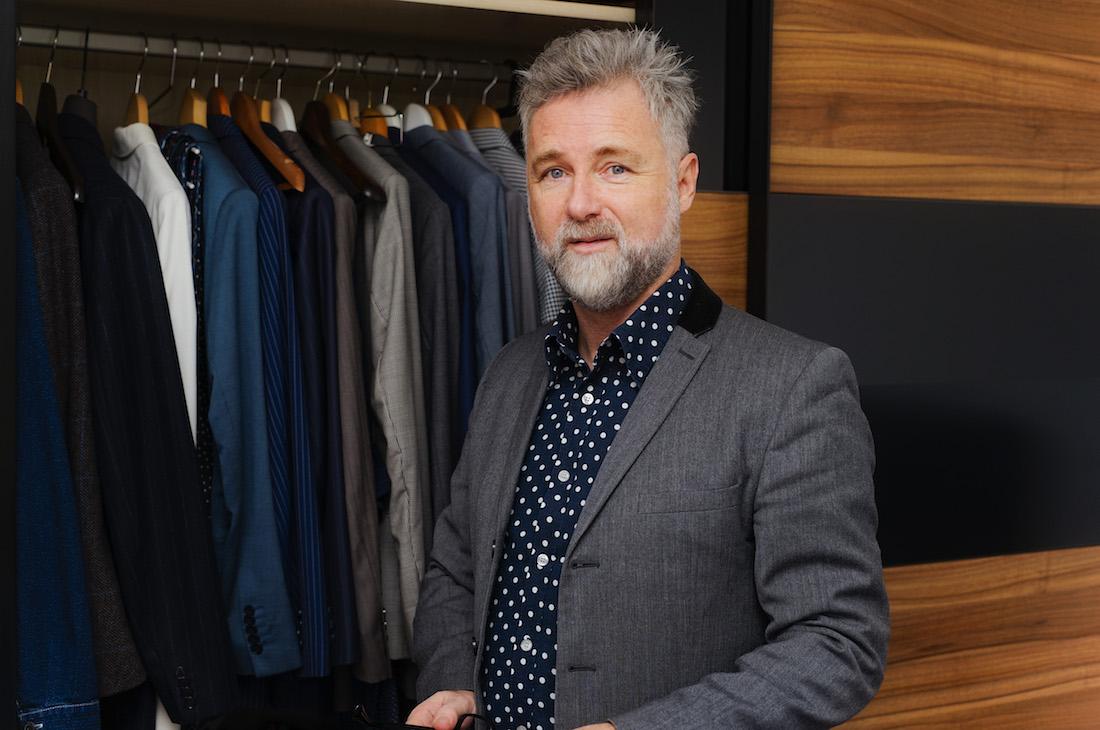
Do you ever log off from work given how passionate you are about sport?
Sometimes on Sundays I feel like going for a walk, switching off for a while. I still watch a lot of sport though. Liverpool - Manchester? You know I can’t miss a game like that! Same goes for the final of the 2018 European Women's Handball Championship. I watched the entirety of the Ryder Cup with my daughter who loves golf too. I can go to the stadium, to the races, anything I enjoy and that reminds me of my childhood. When the Tour de France is on, I don’t leave the country; either I’m on holidays in France, or I’m at work. It completely baffles me that I find myself in a position where I’m paid to watch sport, something I would have ended up doing anyway! Life is good like that sometimes. At this point in my career, I can commentate any football match, I’m comfortable commentating any sporting event, really.
I know you also still write a bit. Do you see yourself staying on TV, or maybe going back to the written press?
I recently wrote an article on Anthony Knockaert, who plays for Brighton, my football club, for the Guardian. We talked about his depression, which is an extremely important topic, but still taboo in elite level sport. I’d really like to keep working for TV and writing. Writing leaves a trace. I have no recordings of all my shows on Canal+ and BeIN, but I have a box in my room where I keep my articles, such as my Guy Roux and Eric Cantona profiles for the Observer, etc. Seeing my name in the paper will always be special. As far as TV work goes, as long as people put up with me, I’ll keep going. Maybe they’ll end up getting bored of my clothes, my accent, my way of doing things. I’m a foreigner working on French TV, there aren’t that many of us. For a long time, I wondered how long they’d tolerate me. I was worried I was only a fad, a character. I love commentating, building TV shows from scratch. I guess what I really want to do, is talk about what I love.